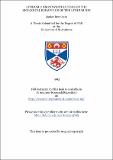Lithium-7 NMR investigations of the biological behaviour of the lithium ion
Abstract
This thesis reports an investigation of the uptake of Li⁺ into human erythrocytes using quantitative ⁷Li-nmr spectroscopy. It was found that the erythrocytes of psychiatric patients, who were on long term lithium therapy for the treatment of bipolar affective disorder, accumulated more Li⁺, and attained an apparent steady-state concentration more rapidly than did the erythrocytes of healthy controls, not taking lithium. This phenomena was shown to be due, at least in part, to a Li⁺-induced effect resulting from the treatment of these patients with Li⁺. Indeed, prior to treatment the uptake of LI⁺ into the erythrocytes from all the patients was similar to that in the erythrocytes of the healthy controls. This Li⁺-induced effect is consistent with the inhibition of the Na⁺-Li⁺ countertransport mechanism, the predominant Li⁺ efflux pathway in erythrocytes, which has previously been shown to be inhibited by Li⁺. The uptake of Li⁺ into cultured cells was also monitored by ⁷Li-nmr spectroscopy, by growing the cells upon the surfaces of microcarrier beads. Excellent spectra were obtained from which the uptake of Li⁺ was found to be approximately ten-fold faster than that into erythrocytes, with the steady- state being achieved more rapidly. In an attempt to rationalise the altered transport behaviour of erythrocytes exposed to Li⁺ in vivo, the effect of this cation upon the major components of the erythrocyte membrane were investigated by TLC and gel electrophoresis. However, no significant differences were observed in either the relative amounts of the lipids, or in the major protein content of the erythrocyte membranes from Li⁺-treated patients and from healthy controls not taking lithium. ⁷Li-nmr spectroscopy was also employed to investigate the interaction between Li⁺ and the enzyme, inositol monophosphatase, however under the conditions of the experiment no interaction was observed. Finally, a brief study of the transport behaviour of the Cs⁺ ion across the human erythrocyte membrane using ¹³³Cs-nmr spectroscopy is reported. The uptake of Cs⁺ into the erythrocytes of patients suffering from alcohol-dependence syndrome, the erythrocytes of whom are reported to contain abnormally high levels of Cs⁺, was found to be virtually identical to that of abstinent controls.
Type
Thesis, PhD Doctor of Philosophy
Collections
Items in the St Andrews Research Repository are protected by copyright, with all rights reserved, unless otherwise indicated.

